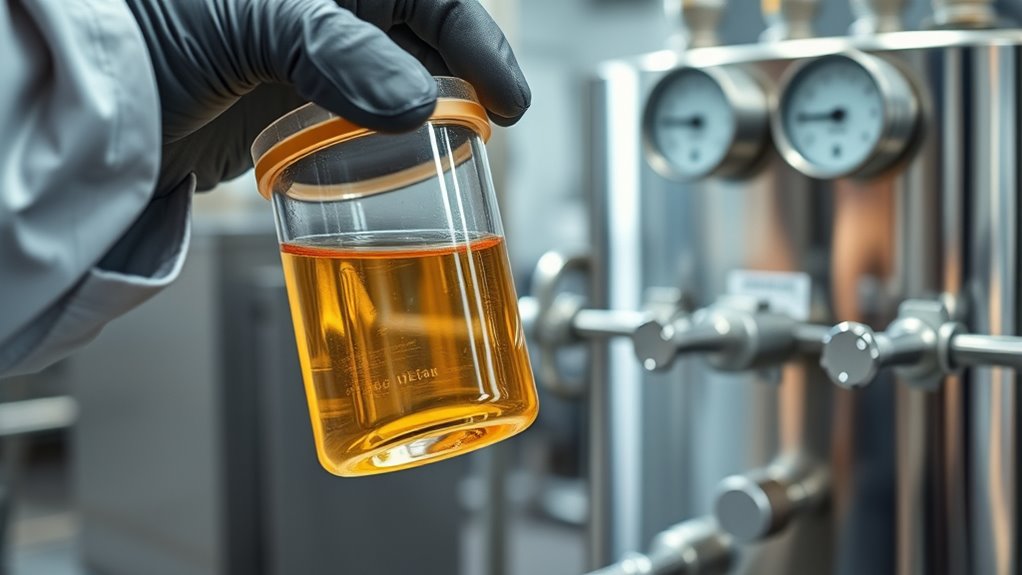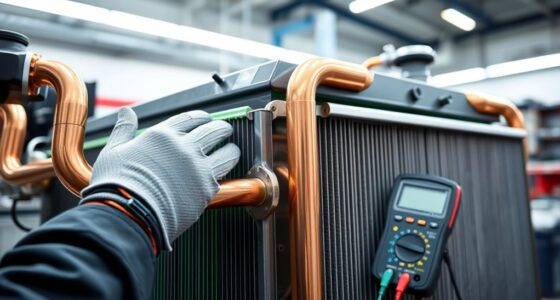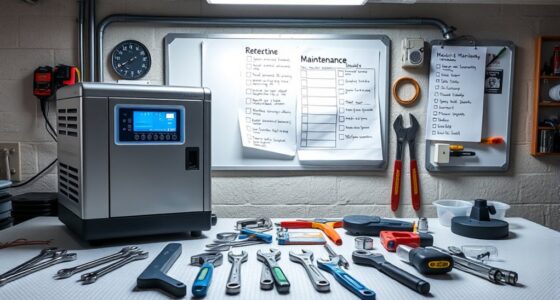To guarantee best diesel engine performance, implement regular fuel filtering and polishing practices. Use multiple filtration stages with coarse and fine filters to remove dirt, water, and microbes effectively. Circulate fuel through the system, especially for stored fuel, to prevent buildup of contaminants. Regularly inspect and replace filters, check seals, and maintain equipment to extend system life. Keep contaminants at bay to protect your engine and avoid costly repairs—discover more strategies to keep your fuel pristine.
Key Takeaways
- Implement multiple filtration stages, including coarse and fine filters, to effectively remove various contaminants from diesel fuel.
- Regularly circulate stored fuel through a polishing system to eliminate sediment, water, and microbial growth.
- Monitor fuel quality indicators such as discoloration and engine performance to determine when filtration maintenance is needed.
- Replace filters and inspect seals routinely to prevent bypassing contaminated fuel and ensure system integrity.
- Customize filtration setups based on equipment requirements and operating environments for optimal fuel purity and engine protection.

Maintaining clean fuel is indispensable for ensuring peak engine performance and avoiding costly downtime. When it comes to diesel engines, one of the biggest threats to reliable operation is diesel contamination. Contaminants like dirt, water, bacteria, and sediments can find their way into your fuel supply, leading to clogged filters, reduced fuel efficiency, and even engine damage. To combat this, you need to implement effective filtration systems that remove impurities before they reach critical engine components. Proper filtration not only prolongs the life of your engine but also guarantees consistent power output and minimizes maintenance costs.
Clean fuel is essential for optimal engine performance and longevity.
Understanding how diesel contamination affects your system is key. Contaminants can enter your fuel during storage, transportation, or even at the point of refueling. Water, in particular, is a major concern because it can promote microbial growth and corrosion inside your fuel tank. When water mixes with diesel, it can cause microbial contamination that clogs your filters and injectors, leading to unpredictable engine behavior. That’s why installing high-quality filtration systems is essential. These systems typically include multiple stages of filtration—such as coarse filters to remove larger particles and finer filters to catch smaller contaminants—ensuring that only clean fuel reaches your engine.
Your filtration system should be designed to fit the specific needs of your equipment. For instance, heavy-duty machinery or fleet vehicles operating in dusty environments may require more frequent filtration and maintenance. Regularly scheduled fuel polishing can help maintain fuel quality over time. Fuel polishing involves circulating your entire fuel tank through a filtration system to remove any accumulated contaminants and water. This process is crucial, especially if your fuel has been stored for an extended period or if you notice signs of contamination like fuel discoloration or engine hesitation. By proactively polishing your fuel, you prevent the buildup of impurities that could cause issues down the line.
Keep in mind that filtration systems are only effective if maintained properly. Regularly changing filters, inspecting for leaks, and ensuring seals are intact will keep your filtration system operating at peak efficiency. Using high-quality filters compatible with your diesel fuel also reduces the risk of bypassing contaminants. Additionally, proper maintenance of your filtration system can significantly extend its lifespan and reliability. When you invest in reliable filtration and proactive fuel polishing practices, you’re taking a critical step toward protecting your engine, reducing downtime, and saving money in the long run. Clean fuel isn’t just about performance; it’s about safeguarding your investment and ensuring your operations run smoothly without interruption.
Frequently Asked Questions
How Often Should Fuel Filters Be Replaced in Different Vehicles?
You should replace fuel filters based on the vehicle-specific guidelines, typically every 20,000 to 30,000 miles or as recommended in your owner’s manual. Check your vehicle’s filter replacement intervals regularly, especially if you notice fuel system issues like reduced performance or rough idling. For older or heavily used vehicles, more frequent replacements may be necessary. Always follow manufacturer recommendations to guarantee peak fuel system performance and longevity.
Can Fuel Polishing Improve Engine Performance Significantly?
Yes, fuel polishing can considerably improve your engine’s performance by reducing fuel contamination. It enhances your filtration systems, removing dirt, water, and other debris that can clog filters and injectors. Regular polishing keeps fuel clean, ensuring ideal combustion and smoother operation. If you notice power loss or engine issues, investing in fuel polishing is a proactive way to maintain efficiency and extend your engine’s lifespan.
What Signs Indicate a Fuel Filter Needs Immediate Attention?
When your engine coughs like a smoker, it’s time to check the fuel filter. Signs include water contamination, which can cause rust and corrosion, and a strong fuel odor indicating possible water or dirt buildup. If your engine stalls unexpectedly or runs roughly, these are clues you need to act fast. Don’t ignore these signs, as they’re your engine’s way of waving a red flag, asking for immediate attention.
Are There Eco-Friendly Options for Fuel Filtering Products?
Yes, you can choose eco-friendly fuel filtering options like biodegradable filters and reusable filtering systems. Biodegradable filters break down naturally, reducing environmental impact, while reusable systems allow you to clean and reuse filters, minimizing waste. These options help you maintain fuel quality responsibly and support sustainability efforts. Switching to eco-friendly filters is a simple step toward greener practices in fuel management, ensuring you protect the environment without sacrificing performance.
How Does Fuel Quality Affect Filter Lifespan and Maintenance?
Fuel quality directly impacts your filter’s lifespan and maintenance needs. When fuel contamination occurs, it accelerates filter degradation, causing it to clog faster and require more frequent replacements. Poor-quality fuel can also lead to filter failure, risking engine damage. To reduce these issues, regularly check and replace filters, and use high-quality fuel to minimize contamination, extending filter life and ensuring your system runs efficiently.
Conclusion
Think of your fuel system as the bloodstream of your engine. Regular filtering and polishing keep it flowing smoothly, preventing dirt and water from clogging your engine’s crucial organs. By staying vigilant with these practices, you guarantee your engine runs like a well-oiled machine, ready to perform at its best. Remember, a clean fuel system is the foundation of reliable, efficient operation—so don’t let contaminants turn your engine into a clogged pipe.









